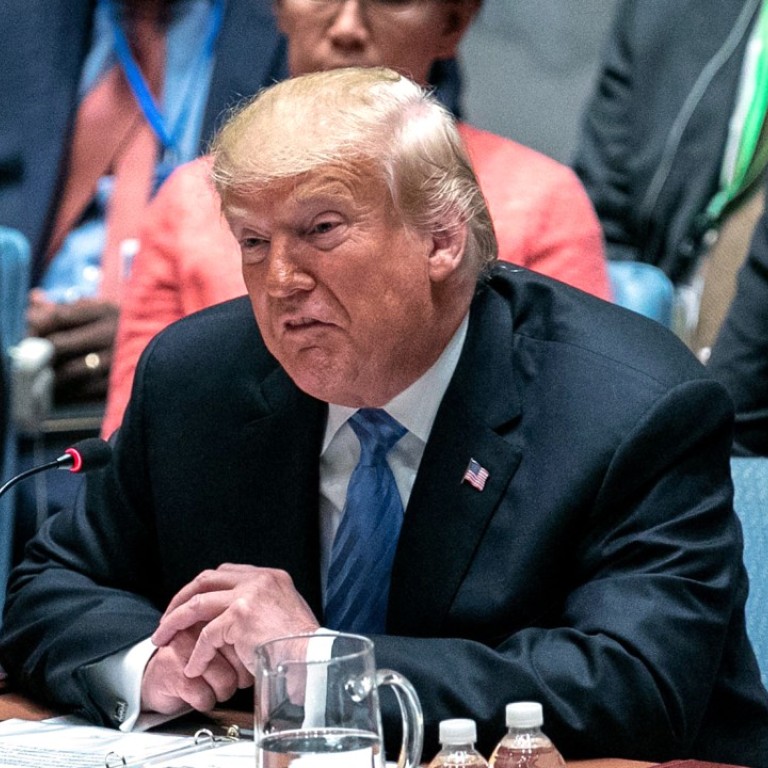
Donald Trump accuses China of seeking to meddle in US midterm congressional elections
‘China has been attempting to interfere in our upcoming 2018 election, coming up in November, against my administration,’ Trump told the UN Security Council
US President Donald Trump accused China of trying to influence the US midterm elections in favour of the opposition Democrats on Wednesday, continuing an assault on Beijing during United Nations meetings in New York.
“We found that China has been attempting to interfere in our upcoming 2018 election, coming up in November, against my administration,” Trump said in a speech to members of the UN Security Council.
Trump, who was chairing the Security Council meeting, tied his accusations to the trade war he started in July in an effort to force Beijing to change its trade and investment policies. His comments come a day after he singled out China in his address to the UN General Assembly for “victimising”, “cheating” and “plundering” US companies and other trading partners.
“They do not want me, or us, to win because I am the first president ever to challenge China on trade, and we are winning on trade,” Trump told the Security Council. “We are winning at every level. We don’t want them to meddle or interfere in our upcoming election.”
He did not provide any evidence for the allegation of election interference. But in a tweet shortly after his UN remarks he criticised an advertising supplement placed by the state-owned China Daily in an Iowa newspaper on Sunday.
“China is actually placing propaganda ads in the Des Moines Register and other papers, made to look like news,” he said. “That’s because we are beating them on Trade, opening markets, and the farmers will make a fortune when this is over!”
The four-page advertisement, which was critical of Trump’s hardline approach on trade, promoted the mutual benefits of US-China trade.
Carol Hunter, executive editor of the Register, defended the supplement. “It’s not surprising that China Daily sought to place advertising with the Des Moines Register because the Register is Iowa’s largest news organisation and Iowa farmers are disproportionately affected by China’s tariffs,” Hunter said.
The practice of foreign governments buying space in US newspapers to promote trade is common and differs from a clandestine operation run by a national intelligence agency.
A senior Trump administration official said China used political, economic, commercial, military and information tools to influence US public opinion and promote the interests of the Chinese government and Communist Party.
US Vice-President Mike Pence plans to make a speech next week detailing the allegations, said the official, who spoke to reporters on condition of anonymity, saying the US government was working to declassify further information on the matter.
According to the Daily Beast website, an administration official speaking on condition of anonymity said that “China is actively interfering in our political system” by using propaganda to influence “businessmen, think tanks, movie studios, journalists, religious leaders and even political candidates depending on whether they criticise or support China’s policies”. But these claims are different from Trump's charge that China is targeting the midterm elections, and the official did not provide details to back up Trump’s remarks, the Beast said.
Trump’s claim opens another point of contention between Washington and Beijing, a relationship already strained by bilateral trade war that is unprecedented in scale, as well as a host of national security concerns that have prompted the US government to impose sanctions on Chinese entities and push for tighter reviews of Chinese investments in the country.
Chinese Foreign Minister Wang Yi, who attended the Security Council meeting, denied Trump’s allegations about meddling.
“We do not and will not interfere in any country’s domestic affairs,” Wang said. “We refuse to accept any unwarranted accusations against China.”
Although the next presidential election is not until 2020, Trump’s agenda will face greater obstacles if the House of Representatives or the Senate – both controlled by his Republican Party – swing back to Democratic control as a result of the midterms on November 6.
Washington has imposed punitive tariffs of either 10 per cent or 25 per cent on US$250 billion worth of Chinese imports. Beijing has responded with extra tariffs on US$50 billion worth of US goods and has threatened further measures.
Beijing called off the high-level trade talks that were scheduled for this week in Washington.
Complicating the state of relations, the US State Department last week imposed economic sanctions on the Chinese defence ministry’s Equipment Development Department (EDD) for its purchase of jets and missile equipment from Russia. Both the EDD and its director, Li Shangfu, were named in the sanctions.
Beijing summoned the American ambassador to China, Terry Branstad, and recalled its naval chief, Vice Admiral Shen Jinlong, from the US on Saturday to protest the sanctions.
In the midst of these tensions, American lawmakers from both parties have raised alarms that Chinese companies in the US may be transferring sensitive technology to China’s military.
“The current administration has employed a new level of scrutiny and gamesmanship” to national security reviews conducted by the Committee on Foreign Investment in the United States (CFIUS), said the China General Chamber of Commerce – USA in a report published just a few weeks before the US levied its first round of tariffs on Chinese imports.
The hundreds of billions of dollars’ worth of deals shot down this year on national security concerns included HNA’s bid for Skybridge Capital, a hedge fund founded by Trump’s one-time communications director Anthony Scaramucci; the US$580 million purchase of US semiconductor company Xcerra by a Chinese investment firm backed by state-owned Sino IC Capital; and the US$117 billion takeover of the semiconductor equipment maker Qualcomm by Broadcom, a Singapore-based company with close ties to Beijing.
Additional reporting by Reuters


